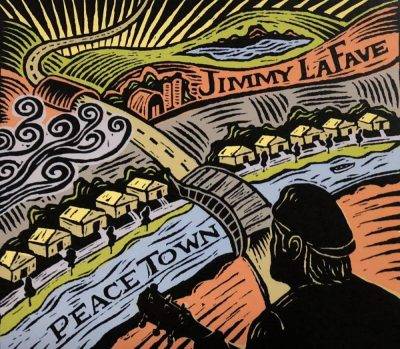Jimmy LaFave Peace Town
Jimmy LaFave
Peace Town
Music Road
Posthumous albums that come barely a year after the artist’s passing can be difficult to listen to. My tears are welling up while writing, knowing how much we’ll miss Jimmy LaFave. He, in the words of Gretchen Peters, possessed not only a “singular voice” but was arguably the best song interpreter of them all. He could transform Dylan songs and those of other artists like Jackson Browne, J.J Cale, and certainly Peters too into his own through unique arrangements, emotional phrasing, and backing musicians who often brought unparalleled intensity to their solos. All those characteristics are present here on this two-disc set, Peace Town, much of which was recorded just months before his all-too-soon passing.
These twenty songs capture the essence of Jimmy LaFave – ballads, rock n’ roll burners, emotive tunes backed by string quartets: as well as tremendous keyboard and guitar work. His ability to mesh several genres is here as one terrific parting statement. LaFave contracted a rare disease and knew he had little time left. As such, he touches on mortality, legacy, life, and love. He revisits two of his own tunes, puts music to three of his hero, Woody Guthrie’s tunes and covers not only Dylan (three times) but Pete Townsend of The Who, The Band, Chuck Berry, Butch Hancock, and Tim Easton to name a few. He also focused on his home state of Oklahoma by nodding to Leon Russell and J.J Cale. Some of the others like Bill Cunningham and David Ball may be lesser known, but Jimmy brings us gems from them too.
These recordings were done through a series of sessions, hence 18 contributing musicians including LaFave. The signature guitar lines of long-time cohort John Inman are ever present, and Stefano Intelisano does all the keyboard work, admirably stepping into the chair of Radoslav Lorkovic, who backed LaFave on many albums. His long-time rhythm section of Bobby Kallus on drums and Glenn Schuerz on bass grace most tracks.
The album begins with Pete Townsend’s “Let My Love Open the Door,” not with the blaring guitars but in the spare LaFave style of guitar and piano, making it a yearning ballad. Intelisano’s B3 gives it some soul. He follows with a remake of his “Minstrel Boy Howling at the Moon,’’ sounding positive and joyous as a troubadour despite his death sentence. (LaFave continued to perform right up until the end, displaying incredible courage). “Peace Town,” the title track, is one of three Guthrie songs that LaFave put music too as he was working on a full compilation of Guthrie tunes before he passed. Here, as in several other places, the harmonies of Jaimee Harris and Jane Ellen Bryant lift the songs to even higher realms.
LaFave transforms Dylan’s “What Good Am I” from Dylan’s Oh Mercy into an almost unrecognizable piano-driven ballad. He also slows down Leon Russell’s “Help Me Make It Through the Day,” featuring blistering guitar solos from Inman with Intelisano supporting on piano. LaFave likes to rock too, revealing that first on Bob McDill’s “I May Be Used (But I Ain’t Used Up), as we hear boogie woogie piano from Intleisano. Of course, he rollicks with Chuck Berry’s “The Promised Land” too. On the other hand, he takes Dylan’s “My Back Pages,” which many have covered in rocking fashion, into reflective, tear-inducing places against Warren Hood’s violin and Intelisano’s gorgeous piano.
All the songs are solid but without talking about each one, let’s look at other highlights. Turning to Disc 2, we have his brilliant cover of The Band’s “It Makes No Difference,” a difficult tune to cover and sing, that LaFave transforms with a beautiful arrangement where the piano takes the place of the sax on the original. This is another tear-inducing tune, especially given Jimmy’s high register vocals on the final verses. He also strips and slows down J.J Cale’s “Don’t Go to Strangers,” making it more intriguing than the original. The string quartet behind David Ball’s “When the Thought of You Catches Up with Me” is the most lilting, heart-breaking tune on the album. Following the expressive Dylan arrangement of “You’re Gonna Make Me Lonesome When You Go” the instrumental jam “Untitled” is an unexpected twist as two or three guitarists engage in a cutting session against Stefano’s swirling B3. Easton’s “Goodbye Amsterdam” with its lines about “never wanting to leave” serves as the perfect closer.
LaFave had a list of over 100 songs he wanted to record before his passing. Thankfully he left us with these twenty, not a filler among them. Even the two instrumentals offer nice interludes. Jimmy LaFave – an artist for the ages. He, as much as anyone, deserves a restful afterlife in “Peace Town.”
- Jim Hynes
[amazon_link asins=’B07D55HVMW,B003TY2RZU,B00TEPCVUO,B008V29JB0,B01DCZYR1C,B00X876AQ0,B000OLHGJS,B00000HYWI,B000059SV4′ template=’ProductCarousel’ store=’maasc-20′ marketplace=’US’ link_id=’12880695-a150-11e8-a338-e9ce6b8da23d’]
Discover more from Making A Scene!
Subscribe to get the latest posts sent to your email.













































